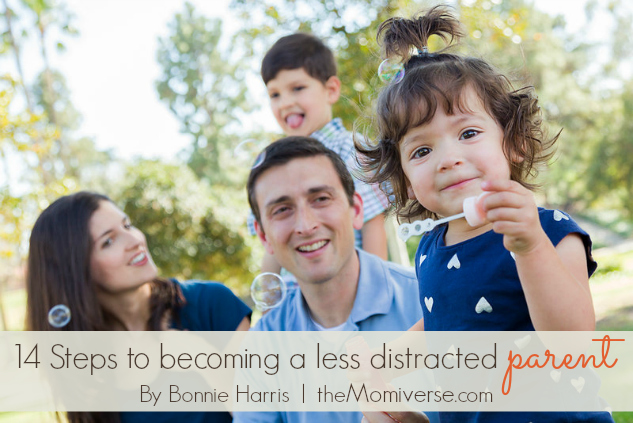Everything about our lives today distracts us from what’s really important – connecting with our inner core so we can better connect with others, especially our children. A less distracted parent is a better model for calmer, more focused children. When parents are rushed and anxious, children feel stressed and resistant.
Here are a few steps to help you become grounded and live a less distracted life:
1. Model more, teach less.
Don’t try to teach your children lessons all the time. That only leads to frenzy and worry. Children learn best from your modeling. Your children feel most connected to you in those precious moments of just being together.
2. Accept the child you have.
If you constantly think: If only…, Why me?, or He never…, you will feel disconnected from your children – and your life. Pay attention to who your child is and what she’s attempting to say instead of wishing she were different.
3. Practice mindfulness.
You don’t have to sit still and meditate to be in the moment. Simply focus on the dish you’re washing, the floor you’re vacuuming, each article of clothing you’re folding, the words and emotions your child is expressing – right now – without jumping to conclusions.
4. Pay attention even when what you hear is unpleasant.
Your child is always attempting to tell you something but doesn’t have the maturity to say it in a way you can easily understand. His words and actions often need interpreting. Don’t take them literally.
5. Practice the pause.
Don’t react to teach your child a lesson. Stop, breathe, wait, and think. Your automatic reaction will be ineffective at best, damaging at worst. Breathe to compose yourself. Come back to the situation when you’re both calm.
6. Establish times and places to be unplugged.
Establish and agree upon the rules together as a family. For instance, set up cellphone-free zones in the car, at mealtime, during family playtime, and at bedtime. Once you have tech devices in your home, don’t spend time fighting to get your children off them. Set technology boundaries together and allow self-regulation, but encourage family time. Proficiency in the tech world is your child’s future.
7. Under-schedule your children.
Emphasize the importance of hanging out and being bored. Creativity doesn’t arise when a child is overly scheduled and adult-directed.
8. Buy less toys and foster more creativity.
Stay away from talking toys and get ones that allow invention. When your child wants to buy an item, ask what it is she wants and how she can make that happen.
9. Accept yourself.
Negative beliefs about yourself, such as I’m not good enough or I can’t do this come from messages you learned from your parents when their buttons were pushed. They are not true.
10. Accept your own emotions and respect your child’s emotions too.
Despite what you may have learned, emotions are always okay. Don’t be tempted with feel-good-now solutions. Even when you’re depressed and despondent, stay with it. Emotions teach lessons and are calls to action. Never blame your emotions on your child.
11. Model positive self-talk.
Get in the habit of staying present with phrases like:
I can deal with this.
This too shall pass.
It’s not the end of the world.
I’m having a hard time right now.
Show your child that life is constantly changing, but you can positively handle it.
12. Stop yourself from catastrophizing.
It’s easy to think the worst of a situation when your children provoke fear and anger. Check yourself when you have thoughts that your child is going to be in jail by the time he’s fifteen, will never have friends, or never follow through on anything. We unnecessarily convince ourselves of the worst.
13. Learn to say no.
Many mothers were brought up to believe that being a good person means taking care of everyone else. Parenting is the toughest job. Prioritize the needs of your family and yourself to stay focused and present.
14. Care for yourself.
You cannot be your best self or fuel your child if you don’t fuel yourself first. Take time and make time for yourself, so you can be a healthier parent. You’re not being selfish; you’re being smart. Show your children how to set boundaries so they grow up to take care of themselves.







{ 1 comment }
I loved the advice!